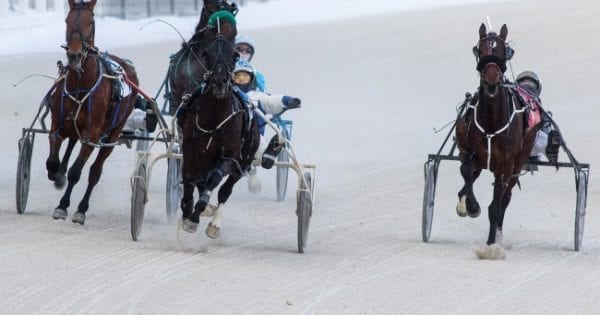

Weather woes at Western Fair
Unusually warm winter weather has already forced the London, ON track to cancel four-and-a-half cards of racing since Boxing Day.
by Dave Briggs
Greg Blanchard said he doesn’t know how many pairs of shoes he’s ruined in the last few weeks while walking the water-logged half-mile track at The Raceway at the Western Fair District in London, ON while trying to determine whether to cancel yet another card of racing. Already, the track’s raceway manager has had to scratch four-and-a-half cards of racing due to unseasonably warm January weather that has turned the track to glop.
“Winter racing, monitoring weather and making those decisions is probably the most stressful part of my job,” Blanchard said Thursday, a day after cancelling Wednesday night’s card. “You’re trying to make the best decision you can based on a number of variables. You’re trying to make a lot of people happy, which isn’t possible. When we get in a stretch like this, for me it’s just consuming because you’re not only worried about that day and trying to make the decision, but as soon as you do, you’re already thinking ahead to the next day, or later in the week based on the forecast.”
The Raceway cancelled its lucrative Boxing Day card (Dec. 26) after five races and then lost its Jan. 2, 3, 10 and 18 cards due to unsafe track conditions.
“We expect there’s a chance we’ll lose days in January and February, typically for snow storms, freezing rain, extreme cold. So, to be losing days in January for milder temperatures that are leading to frost coming out of the track, is a tough pill to swallow… I hate cancelling. It bothers me to cancel,” said Blanchard, who said the decision to cancel or not is made more challenging by a number of factors.
“We’ve got people trucking two and three hours to get here. Some have to get here early for Lasix, so they’re leaving earlier. You’re trying best to make a decision and if you’re going to cancel you’re trying to make that decision early enough that people aren’t already out on the road and trying to get here, weighing that against trying to give it as long as you can to see. As we know, the weather can change, as well. We try to see how the track is going to react. Sometimes the track has to tell us if it’s going to react positively. If we start to see that early in the morning then we feel a lot more confident that it might be okay that night based on the forecast. If it’s going to get colder at night, we know it’s going to tighten up. There’s a lot of different variables, so you’re weighing that all day. You make your decision and you know whatever way you go, it’s probably 50/50. Fifty per cent think you’re making the wrong decision, 50 per cent are thinking you’re making the right decision.”
Though the track has undeniably lost business, Blanchard said he feels most badly for the horsepeople.
“I feel bad for the horsepeople more than anything who are losing out on that chance that week to race. For us, there’s certainly a loss, as well, but I don’t think it’s as significant as it is for the horsepeople,” he said.
Blanchard (above) said the track had forecast to run 10-race cards in January and February and is making up for the lost dates by extending most cards to 11 races. Western Fair may go to as many as 12 races in the next few weeks if the horse population can support it.
Having to cancel the Dec. 26 card after five races was particularly difficult, Blanchard said.
“Boxing Day was the one that hurt because, typically, it’s our second best day of the season (behind the Molson Pace card) in terms of on-track attendance and wagering. We had a full dining room. We got almost half of the card in that day, but you hate to have that happen when you’ve got so many new people there on that particular day,” Blanchard said.
The aborted Boxing Day card came just three days after the track produced an all-time record handle when $765,685 was bet on a special 16-race Dec. 23 card. That was almost $70,000 more than the track’s previous best set on the same date in 2014.
Blanchard said he’s worried the recent spate of cancellations will result in a loss of momentum on the wagering front.
“I’m a big believer in momentum. I certainly believe that has an impact. Customers after three or four cancellations in a short period of time, they could certainly start to turn their attention to another product,” he said, adding the track crew has been diligently fighting the weather problems.
“Our guys, I wouldn’t trade them for anybody,” Blanchard said. “They work tirelessly on this track, but, sometimes, Mother Nature gets the upper hand. We’ve been pretty fortunate. It’s been a long time since we’ve had a winter like this. It’s a different time. Collectively, horsemen and horsewomen just won’t race on tracks that we used to race on. Like anything, times change and industries evolve. Safety is more paramount. That’s a good thing.”
Though the forecast in southwestern Ontario still is predicted to be well above freezing for the next week or so, Blanchard is hoping maybe poor track conditions now will allow the track to avoid problems closer to spring.
“Maybe the fact that we’re having problems now, there won’t be that deep frost in the spring. We might get lucky on that end, but, typically, this is what we deal with in the latter part of March into April when the weather starts to really warm up suddenly,” he said, fingers clearly crossed.
“I can’t remember seeing a January like this with these long stretches of mild weather and rain.”















